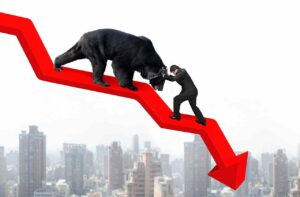Guide to stock investment in Nigeria

As a result of the high inflation rate plaguing the economy, it is imperative to invest money (including savings) because even money kept in bank accounts loses value every day. By investing, you can grow your wealth and beat inflation over time.
Hence, it is wise to commit your money into a veritable venture as against keeping it idle. One of such ventures is the Nigerian stock exchange. In this piece you will learn how to navigate the stock market, invest, and make money from trading stocks with ease.
How the Nigerian stock exchange works is that it provides a secure platform for quoted companies to invite the investing public to subscribe to their shares and other securities. They also regulate the activities of brokers and companies trading the stock market.
A beginner’s guide to stock investment in Nigeria
Many people get stranded when trying to invest in the stock market. This may be due to an acute ignorance of how the Nigerian stock exchange works. Or because unknowingly they’ve once fallen into the trap of a fraudulent investment platform and lost money in the process.
Nevertheless, it is no longer news that fraudsters now hide under the guise of ‘investment companies’ to rip off innocent investors. Hence, one needs to be very careful and follow the right channels in making any investment.
Here’s how to buy shares on the Nigerian stock exchange in four simple steps:
- Choose a stockbroker that best matches your investment goals: To trade in the Nigerian stock exchange, an investor needs a stockbroker who will serve as intermediary between them and the exchange.
Note that, the stock market is structured in a way that individual investors cannot trade on the exchange except through a licensed broker. These stockbrokers normally charge a fee or commission for their services but it is worth it in the end.
Read: 10 Best stockbrokers in Nigeria - Register and Open a trading account: All investors trading the Nigerian stock exchange need a trading account linked to their name. It is the duty of a stockbroker to open a central securities clearing system (CSCS) account for investors.
Your CSCS account number would be used in trading stock in the stock market and tracking all your transactions in the market. - Fund your account with trading capital: Depending on the volume of stock you want to buy and market price, you need to fund your investment account with an amount commensurate to the stock price.
- Manage your investment portfolio: Many investors follow the crowd when investing in the Nigerian stock exchange. Instead of carefully studying the stocks to select the one to invest in, they prefer to go with popular opinion. While this may not be bad in itself, there are better options to following the crowd.
To begin with, your stockbroker is there to guide you through the whole process. It is their duty to advise you on which stocks to buy based on their experience of the market.
They may as well provide in-depth recommendations and speculation of which stock would be profitable to hold or trade over time.
Most brokerage firms make it easier for investors to choose their desired stock and then go ahead to buy on their behalf. Nevertheless, you have the right to instruct a broker whether to purchase a particular stock on your account or not.
How to make money from the Nigerian stock exchange?
The Nigerian bourse is not a get-rich-scheme or a quick-paying platform. It takes strategic planning and proper execution to earn from stock trading. Here are a few tips for investing in the stock market:
Plan your investment goals ahead
As an investor looking to make a profit from trading in the Nigerian stock exchange, it is important to draft out your investment goals before storming the market.
How long do you want to hold stock? Long-term or short-term?
What are your long-term investment goals? How much money do you want to make within a certain period of time? For example, how much do you need to invest to make at least 200K in one year?
What kind of financial instruments do you want to trade? Equities(stocks), bonds, ETFs treasury bills, mutual funds, or others?
What kind of companies are you looking to invest in? For example, technology companies, pharmaceuticals, or industrial companies.
Answering these and many more questions will help you figure out your investment goals.
Conduct detailed research
Before settling on a stockbroker or consenting to buy shares of any company, there is a need to carry out in-depth research.
Find out the trading history of the stockbroker.
Are they registered and therefore, regulated by the Nigerian securities and exchange commission (SEC)?
Are they active or inactive members of the SEC?
Can you afford their services? How much is their fee compared to other brokerage firms? Is there a minimum deposit before you can open an account? (It is common for some brokers to request a minimum deposit before investors can open trading accounts with them).
Can you easily reach out to the stockbroker whenever you want or there are communication barriers?
Do they have a good market reputation?
Find out the risks attached to an investment security before deciding to buy it. While some securities are low-risk profiles, others have a very high risk attached. Therefore, investors should be cautious when choosing between investment options.
Diversify your investments
One useful hack many people do not know about trading the Nigerian stock exchange is effective portfolio diversification. When you diversify your investment interests, you’re simply spreading your money into a range of securities rather than, buying only one.
Trading a variety of high-quality securities reduces the risk of loss. For example, when one stock loses value, the effect will not be as bad as when your whole investment is roped into one.
It would be easier to say ‘buy stock when the price is low and sell when share prices go high’ but these things do not necessarily work like that. The decision on when best to buy stocks is more complicated than that.
The reason is that there are other contributing factors affecting the price movements of shares on the Nigerian stock exchange.
For example, a ‘buy’ signal for investors might be if the company in question is on the verge of groundbreaking innovation. Or they recently formed a partnership alliance with a stronger, international company. Either of these will increase the prospects of the company and get people rushing at their shares.
The hike in demand will in turn force a semi-scarcity resulting in high share prices. At this point, previous stockholders can conveniently ‘sell’ and reap their profit immediately or hold the stock till the price climaxes and sell there.
Now the best time to buy shares would depend on the company in question. In 2020, the stock prices of video call company, Zoom, rose in response to the global demand for their services.
Therefore, investors should keep an eye on happenings that might affect certain company stock prices and take advantage of them.
Another way is to analyse the published financial statements of companies to determine whether they’re making actual profits consistently or not before buying their stock.
Don't miss a thing. Follow us on Telegram and Follow us on WhatsApp. If you love videos then also Subscribe to our YouTube Channel. We are on Twitter as MakeMoneyDotNG.





